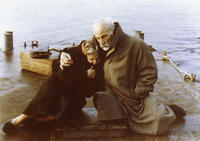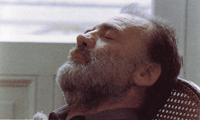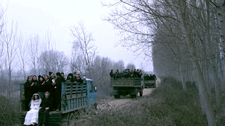 Reconstruction, 1970. An off-camera narrator (Theo Angelopoulos) provides the sobering demographics of an ancient village in northern Greece – a population that dwindled from 1,250 people based on a 1939 census to 85 in 1965 – as a passenger bus traverses the remote, mountainous region on an unpaved road and becomes stuck in a water-logged ditch, requiring the few occupants onboard to exit the public transportation and collaborate in throwing assorted rocks and debris into the shallow pool in order to provide traction for the vehicle. An unidentified man (Thanos Grammenos) arrives at the rural town and makes his way through the desolate streets before entering a modest home where he attempts to engage a reticent girl in polite conversation. The apparent stranger then steps outside in order to embrace a woman and her children as they approach the front yard. An estranged introduction by the woman, his wife Eleni (Toula Stathopoulou) to the young girl inside the house reveals that the man is the girl’s father, Costas, who has been away as a guest worker in Germany. The film then freezes to a shot of the reunited family sitting at the dinner table for a meal as the film credits are displayed on screen – an idyllic and hopeful image that soon evaporates with the subsequent episode of the police fact-finding investigation into his death, presumably at the hands of his adulterous wife and her married lover (Yennis Totsicas). Proceeding achronologically and interweaving interviews conducted by an eager news crew (with the reporter played by Angelopoulos) sent into the quiet town in order to follow the breaking news story, the film presents the seemingly mundane events surrounding the death of the returning guest worker and in the process, presents a bleak portrait of the gradual extinction of the Greek village.
Reconstruction, 1970. An off-camera narrator (Theo Angelopoulos) provides the sobering demographics of an ancient village in northern Greece – a population that dwindled from 1,250 people based on a 1939 census to 85 in 1965 – as a passenger bus traverses the remote, mountainous region on an unpaved road and becomes stuck in a water-logged ditch, requiring the few occupants onboard to exit the public transportation and collaborate in throwing assorted rocks and debris into the shallow pool in order to provide traction for the vehicle. An unidentified man (Thanos Grammenos) arrives at the rural town and makes his way through the desolate streets before entering a modest home where he attempts to engage a reticent girl in polite conversation. The apparent stranger then steps outside in order to embrace a woman and her children as they approach the front yard. An estranged introduction by the woman, his wife Eleni (Toula Stathopoulou) to the young girl inside the house reveals that the man is the girl’s father, Costas, who has been away as a guest worker in Germany. The film then freezes to a shot of the reunited family sitting at the dinner table for a meal as the film credits are displayed on screen – an idyllic and hopeful image that soon evaporates with the subsequent episode of the police fact-finding investigation into his death, presumably at the hands of his adulterous wife and her married lover (Yennis Totsicas). Proceeding achronologically and interweaving interviews conducted by an eager news crew (with the reporter played by Angelopoulos) sent into the quiet town in order to follow the breaking news story, the film presents the seemingly mundane events surrounding the death of the returning guest worker and in the process, presents a bleak portrait of the gradual extinction of the Greek village.
Shot in spare and austere, high contrast black and white, Theo Angelopoulos’ appropriately titled first feature film, Reconstruction, is a haunting and incisive chronicle of the endemic depopulation of Greek rural villages during the mid twentieth century that, as the filmmaker would subsequently explore throughout his career, profoundly contributed to the increasing global irrelevance – the ‘dying’ – of Greek culture towards the end of the century. Based on a real-life village incident and shot during the politically restrictive rule of the military junta, the film’s elliptical (if not deliberately evasive) and non-sequential narrative structure conveys a sense of alienation and non-resolution to the unconscionable tragedy that, in turn, illustrates the nation’s estrangement from its own native cultural heritage through years of devastating wars (World War II and the subsequent Civil War), political unrest, and economic destabilization that contributed to the mass exodus of the population – usually working-age men – searching for employment opportunities and a better life in larger cities (primarily, to the more cosmopolitan Athens) or as overseas guest workers (note the contrast in perception through the inhumane treatment of Yorgos by aimless, xenophobic tenants in R.W. Fassbinder’s Katzelmacher). The film-within-a-film structure that is visually repeated in the shots of Costas arriving home near the beginning and end of the film further reinforces the modern day reality of the inescapable, destructive cycles of migration and familial dissolution that continue to erode Greek identity and village life. By paralleling the geographic and moral desolation of a neglected and abandoned wife with the plight of an ancestral rural village, Angelopoulos reflects the contemporary national trauma of cultural uprooting and suppression of collective history.
 The Travelling Players, 1975. A weary, expressionless acting troupe arrives at a near empty train station in a rural Greek village. The itinerant actors have arrived into town to perform a popular, idyllic, pastoral play entitled Golpho The Shepherdess. The actors seem indistinguishable from each other, and only their literary names, derived from the Aeschylus Oresteia trilogy (Agamemnon, The Libation Bearers, The Eumenides), provide a glimpse into their true character: the father, Agamemnon (Stratos Pachis); the adulterous mother, Clytamnestra (Aliki Georgouli); the traitorous uncle, Aegisthus (Vangelis Kazan); the avenging daughter, Elektra (Eva Kotamanidou); the revolutionary son, Orestes (Petros Zarkadis); and the self-involved daughter, Chrisothemis (Maria Vasileiou). The Travelling Players chronicles the turbulent recent history of Greece, from the Nazi occupation of World War II to the devastating Civil War between the Royalists and the Communists. Throughout the film, the troupe inexhaustibly attempts to perform the same play from village to village, only to be invariably disrupted by air raids, arrests, gunfire, and murder. Even their attempts to reach the next town often prove to be daunting as they encounter the bodies of executed rebels, are detained by supercilious Allied soldiers seeking entertainment, or are terrorized by their own countrymen searching for partisan rebels hiding in the mountains. Figuratively, the travelling players are transient, anonymous supporting players in their nation’s own unresolved history – refugees within their own decimated country – eternally doomed to wander aimlessly through the austere and turbulent landscape, unable to go home again.
The Travelling Players, 1975. A weary, expressionless acting troupe arrives at a near empty train station in a rural Greek village. The itinerant actors have arrived into town to perform a popular, idyllic, pastoral play entitled Golpho The Shepherdess. The actors seem indistinguishable from each other, and only their literary names, derived from the Aeschylus Oresteia trilogy (Agamemnon, The Libation Bearers, The Eumenides), provide a glimpse into their true character: the father, Agamemnon (Stratos Pachis); the adulterous mother, Clytamnestra (Aliki Georgouli); the traitorous uncle, Aegisthus (Vangelis Kazan); the avenging daughter, Elektra (Eva Kotamanidou); the revolutionary son, Orestes (Petros Zarkadis); and the self-involved daughter, Chrisothemis (Maria Vasileiou). The Travelling Players chronicles the turbulent recent history of Greece, from the Nazi occupation of World War II to the devastating Civil War between the Royalists and the Communists. Throughout the film, the troupe inexhaustibly attempts to perform the same play from village to village, only to be invariably disrupted by air raids, arrests, gunfire, and murder. Even their attempts to reach the next town often prove to be daunting as they encounter the bodies of executed rebels, are detained by supercilious Allied soldiers seeking entertainment, or are terrorized by their own countrymen searching for partisan rebels hiding in the mountains. Figuratively, the travelling players are transient, anonymous supporting players in their nation’s own unresolved history – refugees within their own decimated country – eternally doomed to wander aimlessly through the austere and turbulent landscape, unable to go home again.
Theo Angelopoulos creates a harsh, bleak, and profoundly tragic portrait of the dissolution of the national soul in The Travelling Players. Angelopoulos frames the characters through medium and long shots in order to create a distant camera perspective, and reflects their own insignificance in their reluctant roles as peripheral witnesses to the country’s turmoil. The unemotive, Byzantine countenance of the actors, similar to the muted expressions of the characters in Robert Bresson’s films, further manifest, not only the ravaged, desolate villages of the Greek countryside, but also the emotional toll of the unending violence. The lyrics of a repeated ballad echoes the hopelessness and melancholy of the wandering players: “You will come back, no matter how many years go by, you will come back, full of remorse, to ask forgiveness, one night in shame you will come back”. It is an elegy that mourns the loss of a great love, and solemnly awaits the return of a broken soul despite the ravages of time – a haunting, passionate serenade for a wounded nation still attempting to reconcile with its devastating, self-destructive past.
 Voyage to Cythera, 1984. A pensive, middle-aged filmmaker named Alexander (Giulio Brogi, but whose voice was dubbed in Greek by Theo Angelopoulos) on a shooting break from the filming of a semi-autobiographical feature that explores the plight of returning political refugees during the general amnesty of the 1970s, encounters a gaunt, yet ennobled old man selling lavender at a kafeneon (a village cafeteria and lounge). Captivated by the humble vendor who perhaps bears a resemblance to his own absent father, Alexander follows the old man into the mist. Does Alexander, the abandoned son, believe this man to be his father, or does he, the director, envision this frail elder to be the ideal embodiment of the aging partisan (a part that he has been unable to cast) for his film? Reality becomes obscured in the metaphor of the enveloping fog. Soon, the old man, Spyros (Manos Katrakis) emerges from the harbor carrying his meager possessions – a suitcase and a violin – having returned home on a temporary visa after a 32-year exile in Uzbekistan. Politely but disaffectedly acknowledged by his adult children Alexander and Voula (Mary Chronopoulou), he is accompanied to see their mother, Katerina (Dora Volanaki), a nurturing woman who greets him with the simple yet poignant words, “Have you eaten?”. Nevertheless, despite Katerina’s tempered welcome, Spyros’ homecoming invariably proves to be overwhelming as well-intentioned relatives, now virtual strangers, amass at the house for the eagerly awaited reunion. In an attempt to help him readjust to his ‘new’ life, the family decides to travel to their neglected, rural home in a near-deserted village in order to reconnect Spyros with familiar images from his past. Communicating through a series of coded, bird call-like whistles, Spyros reunites with an old family friend named Panayiotis (Giorgos Nezos) at a graveyard populated by fallen contemporaries. It is a bittersweet reconciliation between two aging neighbors – once divided by the devastating civil war – that momentarily brings a sense of closure to the melancholic and emotionally burdened Spyros. However, when Spyros discovers that the village is in the process of being acquired by commercial developers for a proposed resort, his refusal to participate in the sale of the land reopens the town’s unhealed wounds towards the defiant and unapologetic rebel.
Voyage to Cythera, 1984. A pensive, middle-aged filmmaker named Alexander (Giulio Brogi, but whose voice was dubbed in Greek by Theo Angelopoulos) on a shooting break from the filming of a semi-autobiographical feature that explores the plight of returning political refugees during the general amnesty of the 1970s, encounters a gaunt, yet ennobled old man selling lavender at a kafeneon (a village cafeteria and lounge). Captivated by the humble vendor who perhaps bears a resemblance to his own absent father, Alexander follows the old man into the mist. Does Alexander, the abandoned son, believe this man to be his father, or does he, the director, envision this frail elder to be the ideal embodiment of the aging partisan (a part that he has been unable to cast) for his film? Reality becomes obscured in the metaphor of the enveloping fog. Soon, the old man, Spyros (Manos Katrakis) emerges from the harbor carrying his meager possessions – a suitcase and a violin – having returned home on a temporary visa after a 32-year exile in Uzbekistan. Politely but disaffectedly acknowledged by his adult children Alexander and Voula (Mary Chronopoulou), he is accompanied to see their mother, Katerina (Dora Volanaki), a nurturing woman who greets him with the simple yet poignant words, “Have you eaten?”. Nevertheless, despite Katerina’s tempered welcome, Spyros’ homecoming invariably proves to be overwhelming as well-intentioned relatives, now virtual strangers, amass at the house for the eagerly awaited reunion. In an attempt to help him readjust to his ‘new’ life, the family decides to travel to their neglected, rural home in a near-deserted village in order to reconnect Spyros with familiar images from his past. Communicating through a series of coded, bird call-like whistles, Spyros reunites with an old family friend named Panayiotis (Giorgos Nezos) at a graveyard populated by fallen contemporaries. It is a bittersweet reconciliation between two aging neighbors – once divided by the devastating civil war – that momentarily brings a sense of closure to the melancholic and emotionally burdened Spyros. However, when Spyros discovers that the village is in the process of being acquired by commercial developers for a proposed resort, his refusal to participate in the sale of the land reopens the town’s unhealed wounds towards the defiant and unapologetic rebel.
The first film of Theo Angelopoulos’ self-described Trilogy of Silence (that also includes The Beekeeper and Landscape in the Mist), Voyage to Cythera is a sublimely poetic, elegiac, and profoundly moving portrait of disconnection, aging, and obsolescence. Using a film-within-a-film structure, Angelopoulos interweaves personal observation and historical account into a compelling testament on the tragic legacy of the Greek civil war. Through Angelopoulos’ alter-ego, Alexander’s dual role as film director and Spyros’ son (who, in an oblique sense, may not be ‘acting’ in a fictionalized film), Angelopoulos correlates the abandonment, decay, and ruin of the Greek village witnessed by Spyros and his family with the subsequent apathy, callousness, and moral erosion of contemporary society encountered by Alexander as he attempts to find humanity and compassion for the uncertain plight of his disenfranchised and literally adrift father. Angelopoulos further illustrates the underlying hypocrisy of Spyros’ persecution as a forcibly uprooted and marginalized national (who is essentially stripped of his citizenship and reduced to refugee status in his own country) struggling to retain the spirit of a dying culture, even as the community is eager to collective sell its ancestral homeland – its figurative national soul – and move away. Caught in an absurd, existential limbo of bureaucracy and emotional desolation, Spyros’ interminable journey home, like the mythical voyage to Cythera, becomes one of human faith, connection, perseverance, and dignity.
 The Beekeeper, 1986. The film opens to a static shot of an extended dinner table festively covered with a white tablecloth and ornamented with rose petals that is sitting empty at the center of the courtyard in the rain, as the sound of Spyros’ (Marcello Mastroianni) affectionate voice is heard recounting to his young daughter the natural selection process of bees that culminates in the majestic queen’s dance. The guests have retreated indoors for what is revealed to be the wedding reception of Spyros’ daughter – now a grown woman – in the family home. From the onset, the middle-aged schoolteacher’s profound disconnection is immediately palpable as he shares a prolonged, uncomfortable silence with his wife (Jenny Roussea) while picking up shards of broken glass from an overturned tray of wine glasses. Dispirited by his inevitable separation from his beloved daughter, Spyros separates from his wife and embarks on his forefathers’ traditional vocation of apiculture. Traveling southward with his bees on an instinctual springtime migration, Spyros encounters a young hitchhiker (Nadia Mourouzi) who, abandoned on a rural truck stop, insinuates herself on the resigned and acquiescent Spyros through intermittent points on his indeterminate journey. Estranged from an unfamiliar modern world where his generation has become a historically incidental relic, Spyros attempts to reconnect with humanity through the promiscuous and rootless young woman and, in the process, retreats further into the solitude of his dying avocation.
The Beekeeper, 1986. The film opens to a static shot of an extended dinner table festively covered with a white tablecloth and ornamented with rose petals that is sitting empty at the center of the courtyard in the rain, as the sound of Spyros’ (Marcello Mastroianni) affectionate voice is heard recounting to his young daughter the natural selection process of bees that culminates in the majestic queen’s dance. The guests have retreated indoors for what is revealed to be the wedding reception of Spyros’ daughter – now a grown woman – in the family home. From the onset, the middle-aged schoolteacher’s profound disconnection is immediately palpable as he shares a prolonged, uncomfortable silence with his wife (Jenny Roussea) while picking up shards of broken glass from an overturned tray of wine glasses. Dispirited by his inevitable separation from his beloved daughter, Spyros separates from his wife and embarks on his forefathers’ traditional vocation of apiculture. Traveling southward with his bees on an instinctual springtime migration, Spyros encounters a young hitchhiker (Nadia Mourouzi) who, abandoned on a rural truck stop, insinuates herself on the resigned and acquiescent Spyros through intermittent points on his indeterminate journey. Estranged from an unfamiliar modern world where his generation has become a historically incidental relic, Spyros attempts to reconnect with humanity through the promiscuous and rootless young woman and, in the process, retreats further into the solitude of his dying avocation.
The Beekeeper is a haunting, compassionate, and profoundly melancholic portrait of isolation, dislocation, estrangement, and obsolescence. Using episodically contrasting imagery of union and separation, Theo Angelopoulos provides a sustained visual metaphor for the film’s pervasive themes of fracture and disintegration: the assembly of family members for a formal wedding photograph that is followed by their individual departure from the family home, first by the daughter and her new husband, then the wife and son, and finally, Spyros; the opening sequence of the extended dinner table that is representationally shown in fragmented form through repeated shots of empty bistro tables as Spyros re-encounters the hitchhiker; the image of shattered wine glasses that is repeated in Spyros’ impulsive crashing of his vehicle into a restaurant plate window in order to reunite with the young woman; the organized matrix of apiculture boxes during transit that is subsequently shown as individual containers randomly scattered along a hillside open field (that provides visual continuity with the overlooking houses of a distant village). Achieving a visual dichotomy that is both patternistic and deconstructive, the film serves as an indelible chronicle of the destruction of tradition and family, the cultural erosion of contemporary Greek society, and the desolation of the human soul.
 Landscape in the Mist, 1988. “In the beginning was the darkness. And then there was light…” Every evening, Voula (Tania Palaiologou) begins to tell her younger brother, Alexander (Michalis Zeke), the same bedtime tale – the story of creation – and is invariably interrupted by the approach of their distant mother as she momentary peers through the door to ensure that they have fallen asleep. It is an appropriate preface for the children’s own unresolved story of their origin, as they attempt to unravel the mystery of their father’s identity. Each day, they walk to the train station and attempt to stow away on a German-bound train to reunite with their unknown father who, their mother explains, lives in Germany. The children compose letters to their absent father in their thoughts, and await his response in their dreams. Alexander believes that their long-awaited reunion is near, and one day, the children succeed in boarding the train. However, they are soon discovered by the train conductor and turned over to the police. Fearing their premature return, Voula explains that they are visiting their uncle (Dimitris Kaberidis), and the police escort the children in order to see him. The uncle refuses to take custody of them, explaining that the children were born out of wedlock, and that their mother caused their flight by inventing the idea of the nonexistent father in Germany as a means of giving them false hope. Voula refuses to accept her uncle’s explanation and, when the opportunity presents itself, runs away with Alexander from the police station. While travelling on an empty stretch of road, they encounter a cheerful, young itinerant actor named Orestes (Stratos Tzortzoglou) whose family members, intriguingly, are the same world weary actors attempting to perform (albeit, still unsuccessfully) Golpho the Shepherdess in The Travelling Players. Orestes is leaving for the military, but has grown fond of the children, and has decided to spend his final hours helping them reach the border town of Thessaloniki. But as the children continue on their misguided and unattainable quest, can they find redemptive meaning beyond their fruitless journey?
Landscape in the Mist, 1988. “In the beginning was the darkness. And then there was light…” Every evening, Voula (Tania Palaiologou) begins to tell her younger brother, Alexander (Michalis Zeke), the same bedtime tale – the story of creation – and is invariably interrupted by the approach of their distant mother as she momentary peers through the door to ensure that they have fallen asleep. It is an appropriate preface for the children’s own unresolved story of their origin, as they attempt to unravel the mystery of their father’s identity. Each day, they walk to the train station and attempt to stow away on a German-bound train to reunite with their unknown father who, their mother explains, lives in Germany. The children compose letters to their absent father in their thoughts, and await his response in their dreams. Alexander believes that their long-awaited reunion is near, and one day, the children succeed in boarding the train. However, they are soon discovered by the train conductor and turned over to the police. Fearing their premature return, Voula explains that they are visiting their uncle (Dimitris Kaberidis), and the police escort the children in order to see him. The uncle refuses to take custody of them, explaining that the children were born out of wedlock, and that their mother caused their flight by inventing the idea of the nonexistent father in Germany as a means of giving them false hope. Voula refuses to accept her uncle’s explanation and, when the opportunity presents itself, runs away with Alexander from the police station. While travelling on an empty stretch of road, they encounter a cheerful, young itinerant actor named Orestes (Stratos Tzortzoglou) whose family members, intriguingly, are the same world weary actors attempting to perform (albeit, still unsuccessfully) Golpho the Shepherdess in The Travelling Players. Orestes is leaving for the military, but has grown fond of the children, and has decided to spend his final hours helping them reach the border town of Thessaloniki. But as the children continue on their misguided and unattainable quest, can they find redemptive meaning beyond their fruitless journey?
Landscape in the Mist is a poignant, lyrical, and allegorical fable on the human struggle for identity and connection. By revisiting the itinerant acting family of The Travelling Players, Theo Angelopoulos expounds on the transient, yet cyclical process of life as the common, universal bridge of human experience: the image of a dying horse on the snow (reminiscent of Robert Bresson’s Au Hasard Balthazar) juxtaposed against a wedding celebration; Orestes’ departure from his family vocation to join the military, the odd image of a large statue hand rising from the sea that metaphorically connects the cultural legacy of ancient Greek civilization to contemporary Greece. Like the symbolic, disembodied sculptured hand, the children, too, are incomplete – severed from their heritage by being denied a relationship with their father. And like the struggling travelling players, the children have embarked on a endless journey from which there is no return. However, in their struggle to overcome the artificially created borders (a theme similarly explored by Andrei Tarkovsky) that separate them from their elusive German father, the children find their own path to closure and personal reconciliation. In the haunting, surreal final scene, the children embrace a surrogate connection to their ancestral history – a universal icon that binds all humanity towards a shared purpose of survival and continuity – an enduring symbol of nature and life.
 Eternity and a Day, 1988. Alexandre (Bruno Ganz) has reluctantly dismissed his devoted housekeeper, Urania (Helene Gerasimidou), explaining that he is about to embark on a “long journey” from which he does not intend to return. It is a vague euphemism that allows him to say good-bye to his loved ones without the sentimentality of revelation. The reality is that he is terminally ill, and the doctor has advised him to go to the hospital when the pain becomes unbearable. Tomorrow is the fateful day – the beginning of the end – and all that is left for Alexandre is to get through this final day. He pays an unexpected visit to his daughter, Katerina (Iris Chatziantoniou), who asks about his one literary obsession. He has lived a long and prosperous life of a renowned poet and writer, but has been consumed by one project since his wife, Anna’s (Isabelle Renauld), death: to complete an unfinished poem entitled The Besieged Free by a nineteenth century immigrant poet named Solomos. Alexandre hands Katerina a collection of unopened letters belonging to his late wife. Among them is a letter without an envelope – a poignant, affectionate disclosure of love and longing written by a young wife to her distracted, work-obsessed husband. Alexandre momentarily finds himself returning to the memories of his past – to an idyllic summer day that never was – to a perfect day with his beloved Anna and their new daughter. But the images are fleeting, and Alexandre is left with a more pressing matter at hand: to find a new home for his dog. He unwittingly interrupts a wedding ceremony in order to ask Urania to care for the dog. Urania urges him to take her with him on his “trip”, but he declines. Death is, after all, a solitary journey. While waiting for his prescription to be filled at a local pharmacy, he sees a young Albanian window washer (Achileas Skevis) abducted into a van. Alexandre rescues the boy, and resolves to take him back to his war-torn homeland. In the process of attending to the welfare of the young refugee, he reconciles with the guilt and regret of his selfish past and learns to accept his fate.
Eternity and a Day, 1988. Alexandre (Bruno Ganz) has reluctantly dismissed his devoted housekeeper, Urania (Helene Gerasimidou), explaining that he is about to embark on a “long journey” from which he does not intend to return. It is a vague euphemism that allows him to say good-bye to his loved ones without the sentimentality of revelation. The reality is that he is terminally ill, and the doctor has advised him to go to the hospital when the pain becomes unbearable. Tomorrow is the fateful day – the beginning of the end – and all that is left for Alexandre is to get through this final day. He pays an unexpected visit to his daughter, Katerina (Iris Chatziantoniou), who asks about his one literary obsession. He has lived a long and prosperous life of a renowned poet and writer, but has been consumed by one project since his wife, Anna’s (Isabelle Renauld), death: to complete an unfinished poem entitled The Besieged Free by a nineteenth century immigrant poet named Solomos. Alexandre hands Katerina a collection of unopened letters belonging to his late wife. Among them is a letter without an envelope – a poignant, affectionate disclosure of love and longing written by a young wife to her distracted, work-obsessed husband. Alexandre momentarily finds himself returning to the memories of his past – to an idyllic summer day that never was – to a perfect day with his beloved Anna and their new daughter. But the images are fleeting, and Alexandre is left with a more pressing matter at hand: to find a new home for his dog. He unwittingly interrupts a wedding ceremony in order to ask Urania to care for the dog. Urania urges him to take her with him on his “trip”, but he declines. Death is, after all, a solitary journey. While waiting for his prescription to be filled at a local pharmacy, he sees a young Albanian window washer (Achileas Skevis) abducted into a van. Alexandre rescues the boy, and resolves to take him back to his war-torn homeland. In the process of attending to the welfare of the young refugee, he reconciles with the guilt and regret of his selfish past and learns to accept his fate.
Theo Angelopoulos creates a stunningly haunting, seamless fusion of reality, nostalgia, and dreams in Eternity and a Day. Using long takes and reverse tracking, Angelopoulos creates a visual metaphor for the isolation of the soul: the hallway shot of Alexandre after Urania’s departure; a team of window washers descending on cars at a stop light; the framed shot of Anna by the gate of the summer house. Moreover, recurrent images of abandoned buildings, repeated flights of Albanian refugees across the border, and the unfinished poem, reflect Alexandre’s regret over his own unresolved actions. Figuratively, Alexandre, too, is an exile – longing to recapture an irretrievable past – unable to return home.
 The Suspended Step of the Stork, 1991. The first film of what would be loosely considered Theo Angelopoulos’ Trilogy of Borders, The Suspended Step of the Stork opens to the tumultuous and disconnected stationary long shot of a helicopter hovering over an indistinguishable, formless, dark mass floating lifelessly in an undulating open sea that has been encircled by a small fleet of recovery boats. The voice of a journalist, Alexandre (Gregory Karr) provides a grim context to the disorienting sight, as a group of Asian stowaway asylum seekers, having been refused entry into the country by the government, chose instead to end their lives by jumping into the hostile, open waters rather than be returned to their native land. The provocative image of adriftness, alienation, and disposability, a recurring theme within Angelopoulos’ cinema that is visually anticipated in two iconic sequences in his earlier films – the disembodied sculptural hand towed by helicopter from the sea in Landscape in the Mist, and the aging couple cast out into the sea on a raft in Voyage to Cythera – in turn, serves as a prefiguration of the statelessness, refugeeism, and dispossession created by the institution (and institutionalization) of man-made borders in the film.
The Suspended Step of the Stork, 1991. The first film of what would be loosely considered Theo Angelopoulos’ Trilogy of Borders, The Suspended Step of the Stork opens to the tumultuous and disconnected stationary long shot of a helicopter hovering over an indistinguishable, formless, dark mass floating lifelessly in an undulating open sea that has been encircled by a small fleet of recovery boats. The voice of a journalist, Alexandre (Gregory Karr) provides a grim context to the disorienting sight, as a group of Asian stowaway asylum seekers, having been refused entry into the country by the government, chose instead to end their lives by jumping into the hostile, open waters rather than be returned to their native land. The provocative image of adriftness, alienation, and disposability, a recurring theme within Angelopoulos’ cinema that is visually anticipated in two iconic sequences in his earlier films – the disembodied sculptural hand towed by helicopter from the sea in Landscape in the Mist, and the aging couple cast out into the sea on a raft in Voyage to Cythera – in turn, serves as a prefiguration of the statelessness, refugeeism, and dispossession created by the institution (and institutionalization) of man-made borders in the film.
On assignment at a military outpost near the Greek-Turkish border (perhaps a documentary on the growing refugee problem, or the inhuman economic and moral conditions of the marginal communities that have developed near the border as a result of the refugees’ status in bureaucratic limbo as unwanted, non-legal residents in the country who, for humanitarian reasons, cannot be compelled to return home), Alexander’s attention is soon diverted from the project after a chance encounter with an Albanian refugee selling potatoes from a produce market on the riverbank, a handsome and distinguished-looking man (Marcello Mastroianni) who bears a striking resemblance to a well-respected statesman, social philosopher, and author who, at the height of his political and creative popularity, abandoned his beautiful, devoted French wife (Jeanne Moreau), walked away from his cabinet position, and disappeared into complete obscurity. Convinced that the refugee is, indeed, the missing statesman, Alexandre seizes an opportunity to embark on what on the surface appears to be a sensational exposé of the man’s strange plight and inscrutable transformation from national leader to marginalized figure, enlisting the aid of his abandoned wife who, despite having moved on with her life, still continues to harbor the wounds of his silence and self-imposed isolation during the final days of their marriage (a profound estrangement that loosely echoes their previous relationship in Michelangelo Antonioni’s La Notte). However, as Alexandre continues to search for clues to the refugee’s real identity, he becomes increasingly haunted with the underlying reasons that led to the statesman’s disappearance itself, a personal quest that would be further intensified by his attraction to an enigmatic young woman (Dora Chrysikou) whose childhood sweetheart remains stranded on the other side of the border, separated by the Evros River.
In examining the psychology of fugue, rootlessness, and self-erasure, Angelopoulos transforms the themes of identity and collective memory into a broader exposition on the absurdity of factionalism, sectarianism, and ethnic cleansing that have not only enabled wide-scale depopulation, migration, and displacement, but more importantly, contributed to an accelerated, selective cultural extinction and disposability (most directly, in Angelopoulos’ (then) observation of the protracted Balkan Wars following the break-up of the former Yugoslavia in the wake of the collapse of the Soviet Union). Juxtaposed against the recurring image of yellow-jacketed telephone technicians installing new service lines along the desolate frontier (figuratively bringing civilization closer, even in the most remote populations), the stranded refugees’ plight presciently underscores the unwitting upshot of technology and globalism at the end of the twentieth century. It is this paradox of the information age that inevitably defines Alexandre’s unreconciled search for identity and connection in a community of faceless, invisible witnesses of a silent (and silenced) history – a perversion of social ideals that has cultivated, not the intimacy of an egalitarian, interconnected global village, but rather, a culture of exclusion enabled by the creation of artificially constructed borders (a theme of interpenetrating real and metaphysical borders that is similarly woven through Claire Denis’ film, L’Intrus), and that, in defining arbitrary bounds of privilege and entitlement, foments its own cultural genocide through systematic isolation, social stratification, marginalization, and xenophobia.
Acquarello 2000-2007 [reprinted]